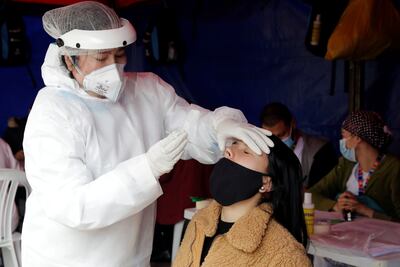Follow the latest updates on the Covid-19 pandemic here
A new variant of Covid-19 called Mu has gained global attention after the World Health Organisation (WHO) labelled it a “variant of interest” last week.
Mu has been reported in at least 40 countries and every US state except Nebraska.
While the variant represents only 0.1 per cent of global variant sequencing, the WHOs has voiced its concern over its reported characteristics of vaccine resistance and its ability to commingle with the Delta variant.
The top US infectious diseases doctor, Anthony Fauci, said last week that the newest variant is not an “immediate threat".
“We're certainly aware of the new variant,” Dr Fauci said. “We're keeping a very close eye on it.”
He suggested that, while the variant's strength against currently available vaccines needs further investigation, vaccination is still the best course of action against it.
“Remember, even when you have variants that do diminish somewhat the efficacy of a vaccine, the vaccines still are quite effective against variants of that type,” Dr Fauci said.
Where did it originate?
Mu was first discovered in Colombia in January and propelled the latest Covid wave in the country. The surge in cases and deaths lasted from April to June, with as many as 700 people dying each day in the country of 50 million.
It may be over its Mu-influenced surge, but the variant currently accounts for at least 39 per cent of cases in Colombia, the WHO reported.
In nearby Ecuador, the variant represents about 13 per cent of cases, the WHO said.
Where is the Mu variant observed today?
Outbreak.info, a Scripps Research database referencing the globally funded GISAID Initiative, said Mu has mostly been observed in the Americas and Europe so far, though it is popping up in South Korea and Japan.
At least 46 countries had sequenced the variant as of September 7.
The database says there are over 2,300 cases of the variant in the US.
The US Centres for Disease Control and Prevention (CDC) says Mu accounts for at least 0.5 per cent of cases in the country.
Why is it a 'variant of interest'?
There are concerns that Mu may bypass the protection of Covid-19 vaccines, which has influenced calls for further research.
The WHO describes new variants as being “of interest” when they show the potential to possess characteristics such as increased transmissibility or the ability to avoid detection by standard tests.
If these or other characteristics are confirmed to be present, the variant is moved into the category of “variant of concern".
“The Mu variant has a constellation of mutations that indicate potential properties of immune escape,” the WHO said in a report published last week.
The organisation compared the Mu variant's reported ability to reduce vaccine efficacy to what has been seen in the Beta variant, which weakens mRNA vaccines to 77 per cent effectiveness.
The WHO has requested further investigation into the variant and how it might circulate and interact with the dominant Delta variant.












